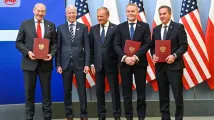Poland's industry ministry working on strategy for steel industry; PM announces synergies
Poland's Ministry of Industry (MP) is working on a strategy for the steel industry, minister Marzena Czarnecka told a conference at Huta Czestochowa smelter that has been just taken over by the Ministry of National Defence (MON). In turn, Prime Minister Donald Tusk announced building the synergies and a shift by the state and the Polish Armaments Group PGZ to long-term procurement to support the sector.
"We have, of course, wide-ranging plans regarding the smelters, because it is not only Huta Czestochowa, (...) which has electric furnaces, (...) i.e. it's not the most environmentally friendly smelter imaginable in Polish metallurgy and beyond; but it also concerns the fact that we are working in the ministry on a strategy for the metallurgy as such, in cooperation with other ministries," Czarnecka said.
Poland's Prime Minister Donald Tusk, who also attended the conference at Huta Czestochowa, stressed that the fact that the Ministry of National Defence (MON) is becoming the owner of this smelter, means guarantees of long-term orders both fort Huta Czestochowa, and for the plants cooperating with it.
"The big money that Poland spends on armaments, but also the big money that the European Union wants to spend on armaments, will also finally start to go to Poland, to plants such as Huta Czestochowa," Tusk said.
"This requires our actions (...) and we will not give up them up. Polish companies must be supported by all available methods by their own state, and they will be supported," he added, also signalling the possibility of supporting Henryk Cegielski's heavy engineering plants in Greater Poland region.
Prime Minister Tusk pointed out that now that the decision has been made and it is time for its implementation, his intention is that the Polish Armaments Group PGZ and the Polish state more broadly should switch to long-term orders.
"(...) but we will buy what is needed by the Polish army, what is really needed not only for the country's defence, but may also have a dual use, and for this we will also obtain European funds, if necessary," he said.
Tusk announced that he would take a close look at what the tension is today between PGZ and parts of the Cegielski plants, and whether this problem could not be resolved quickly, provided that in some "conceivable" perspective state aid would make production profitable.
Poland's Prime Minister said he would build synergies in the sector; he also did not rule out synergies with the financially distressed listed engineering company Rafako in the future.
"Rafako will be a plant that not only will produce but will produce things that are profitable. We are working to put more specialised armaments production in Raciborz perhaps right where the boilers were produced. We are working on several options," Tusk noted.
In mid-April, Poland's industry ministry reported that the implementation of the repair plan for the smelters of Weglokoks, Huta Pokoj Profile and Huta Pokoj Konstrukcje should lead to the restoration of their operational profitability within a year.
At the time, the state assets minister stressed that the continuing difficult situation in the industry is causing steel companies, including those centred around the State Treasury, to find themselves in a difficult financial situation.
jz/ mcb/ ao/


